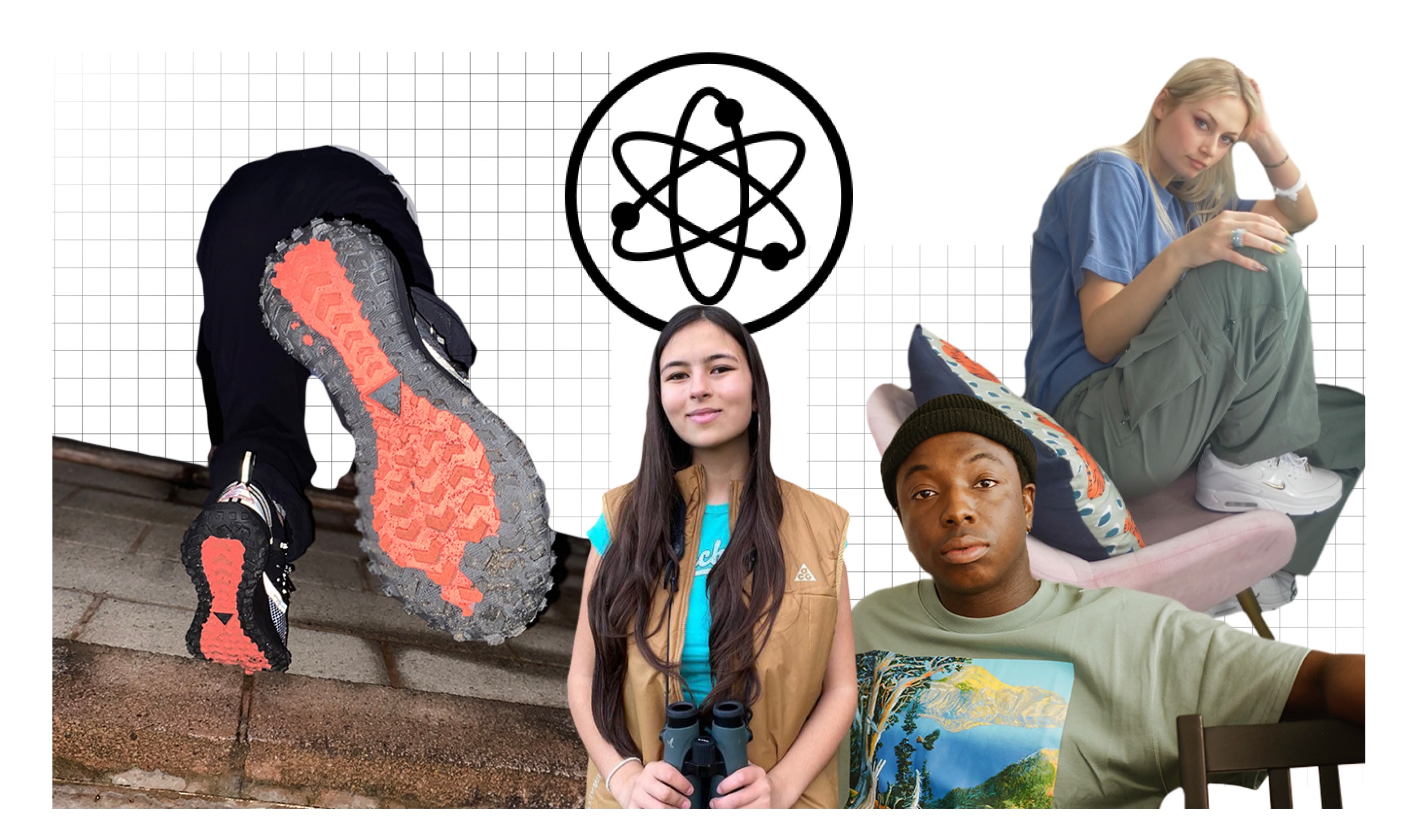
As we head into the uncertainty surrounding the year to come, the lives of many still remain drastically different to what was before. The global pandemic has allowed us to take a step back and appreciate the world around us. With silenced workplaces, the ever-growing need for adventure and exploration into the natural world has inhabited the minds of many, making a generation of new-found outdoor-spirit that has re-engaged us with nature for a prolonged positive mindset.
MYA-ROSE CRAIG
19-year-old Mya Rose-Craig has a list of achievements that it’s hard to believe fit into her two decades on Earth. The British-Bangladeshi birder and environmentalist who lives between Bristol and Bath also launched her popular Birdgirl blog when she was 14 and has an honorary science doctorate from the University of Bristol. In 2016 she launched Black2Nature, an initiative aiming to get more ethnic minorities engaged with nature, increasing access for people who live in cities, and may not have much opportunity to see wide, open, green spaces, packed with wildlife. So you know, she’s busy. Here, she talks about the importance of the outdoors, and her mission to diversify nature.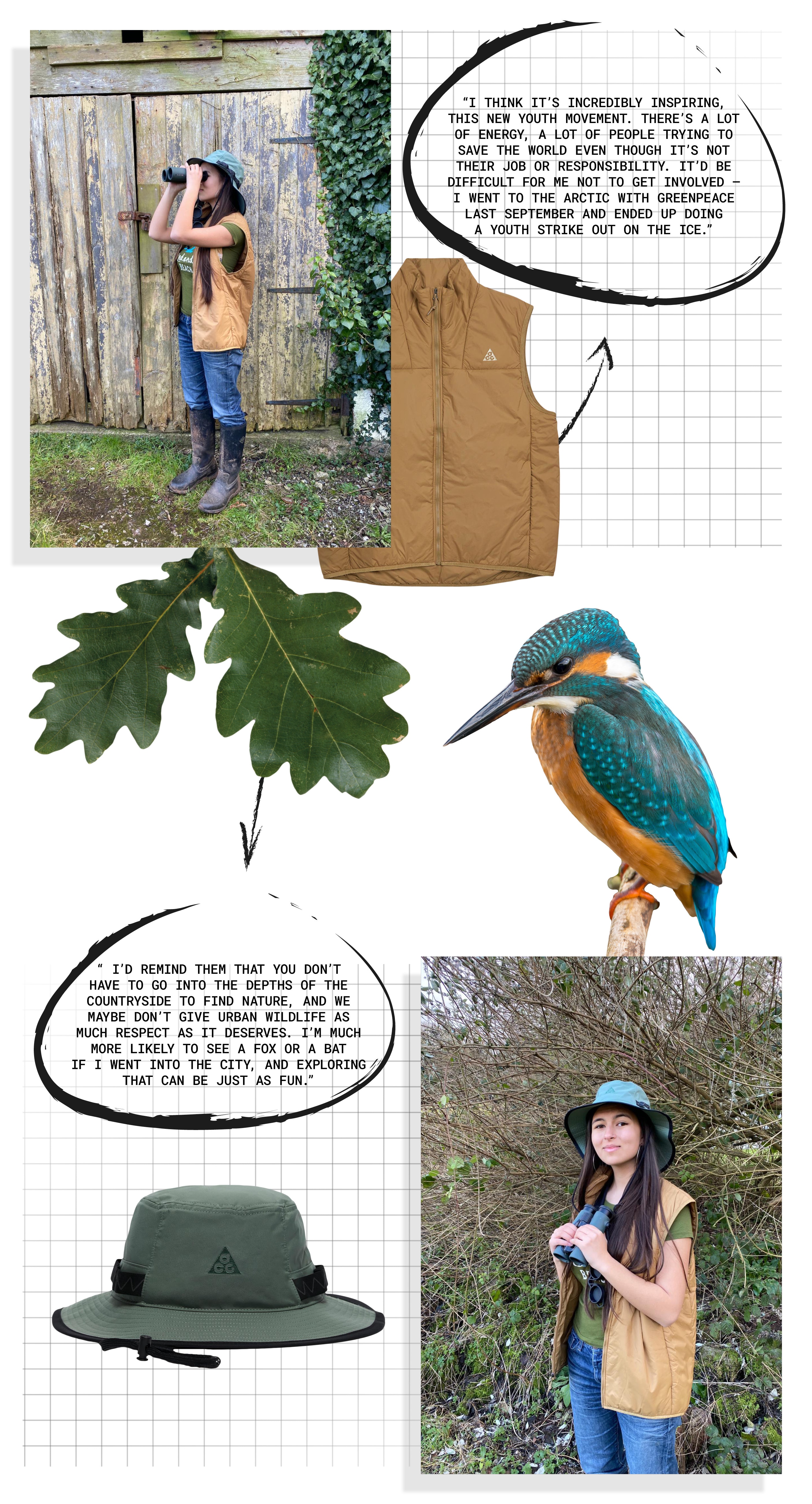
What sparked your passion for the outdoors? How did you fall in love with it?
Mya-Rose Craig: I don’t think there was really a start for me, as my parents and my older sister were really into the outdoors and into bird watching before I was even born. I don’t think there was a single moment, it’s always been a really big part of my life.
Tell us about Black2Nature and why it's important. Why do you think environmentalism and enjoying nature isn't as diverse as it should be?
Mya-Rose Craig: I started Black2Nature because I’m really into the environment and I love birds, but I’m also half-Bangladeshi. As I got older, aged around 11 or 12, I’d really started to notice how white the countryside was. I’d had a lot of opportunities to get out into nature and I thought it was a shame other kids hadn’t had that chance. I started running nature camps when I was 13, so I’ve been doing that for nearly six years now. In 2016 we did a conference called Race Equality In Nature to figure out what the barriers are - it’s complex and it’s a really broad spectrum. Some issues are relatively easy to solve, like some people from these communities are scared of dogs. Some issues are more systemic, like some people didn’t want to go to the countryside because they thought it was white and elitist and they weren’t welcome. It’s those barriers we’re trying to break down in the camps that we run.
How have you seen things change?
Mya-Rose Craig: When I started out it was a very uncomfortable conversation for a lot of people in the UK’s nature sector. People don’t like being told that there might be bias, or discrimination or racism at play in the spaces that they work, especially if they pride themselves as being progressive. When I started the attitude was “it’s not our problem, we’re not stopping them from coming”. But it went from something that was being sidelined and ignored to being an issue that a lot of organisations have realised they need to sort out ASAP.
Has the pandemic changed your appreciation of nature in anyway?
Mya-Rose Craig: People assume that because I like nature, I’m able to spend loads of time in nature. But I was studying before the pandemic, doing my A-Levels, I was really busy. After that, I was able to spend a lot of time outdoors, watching the birds, in a way that wasn’t super common for me. I gained a new appreciation for the area I live in, how special it is. As a diversity campaigner it’s been really exciting, just seeing loads of people venturing outside the city, often the first time, because it’s the first time that they’ve had the time, desire, or the money to go out into the countryside. It’ll be interesting to see if that carries on post-corona.
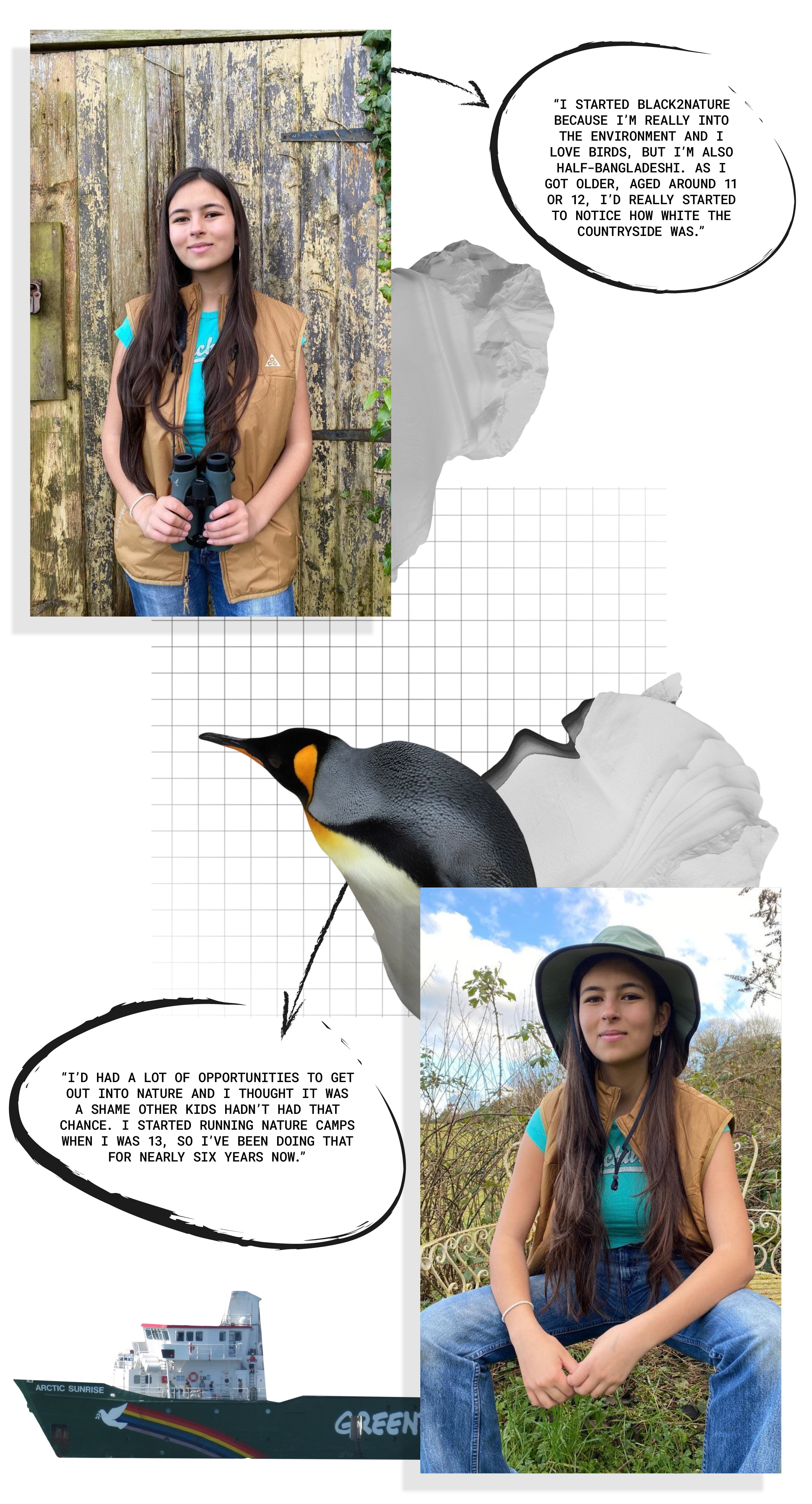
What do you hope they take from bird watching? Do you find it beneficial for your peace of mind and mental health?
Mya-Rose Craig: I just started a podcast called Get Birding which is all about this. Especially at the moment, I feel like it’s such a good hobby for people to take up. Birds are a really good, easy access point to nature. Even if you live in a really urban space there’ll be some kind of bird. You don’t need fancy equipment – all you need to do is go out and watch birds and you’ve become a birdwatcher.
The last couple of years has seen an explosion in climate activism led by teenagers. Are you inspired for the future?
Mya-Rose Craig: I think it’s incredibly inspiring, this new youth movement. There’s a lot of energy, a lot of people trying to save the world even though it’s not their job or responsibility. It’d be difficult for me not to get involved – I went to the Arctic with Greenpeace last September and ended up doing a youth strike out on the ice. Greta (Thunberg) also came to Bristol and I was lucky enough to speak onstage with her which was really cool. The climate movement is so important.
What advice would you give to a young person who lives in a city but wants to get into nature?
Mya-Rose Craig: I’d remind them that you don’t have to go into the depths of the countryside to find nature, and we maybe don’t give urban wildlife as much respect as it deserves. I’m much more likely to see a fox or a bat if I went into the city, and exploring that can be just as fun. Birders talk quite a lot about having a local patch, a habitat you go back to all the time to get to know that piece of land, know the animals and the birds that live there. A lot of people who live in the city find their own little piece of nature, their local patch. I think that right now, while we’re all locked in our houses, that could be a really brilliant thing to do.
NATE AGBETU
Nate Agbetu was born and raised in Stoke Newington. While he may have remained in East London his whole life he’s never creatively sat still, having worked on numerous subculture projects, set up his own agency Play Nice, and directed a film called The New Rave in partnership with The Design Museum celebrating the impact of black people on electronic music.
Directing is something that Agbetu will be doing more of in 2021, but community is hugely important to him, as represented by The Pattern, Play Nice’s recently launched talent incubator and curriculum that gives young creatives budget and mentorship to develop community projects. We spoke to Agbetu about his shifting perspectives and why nature became his best friend in 2020.
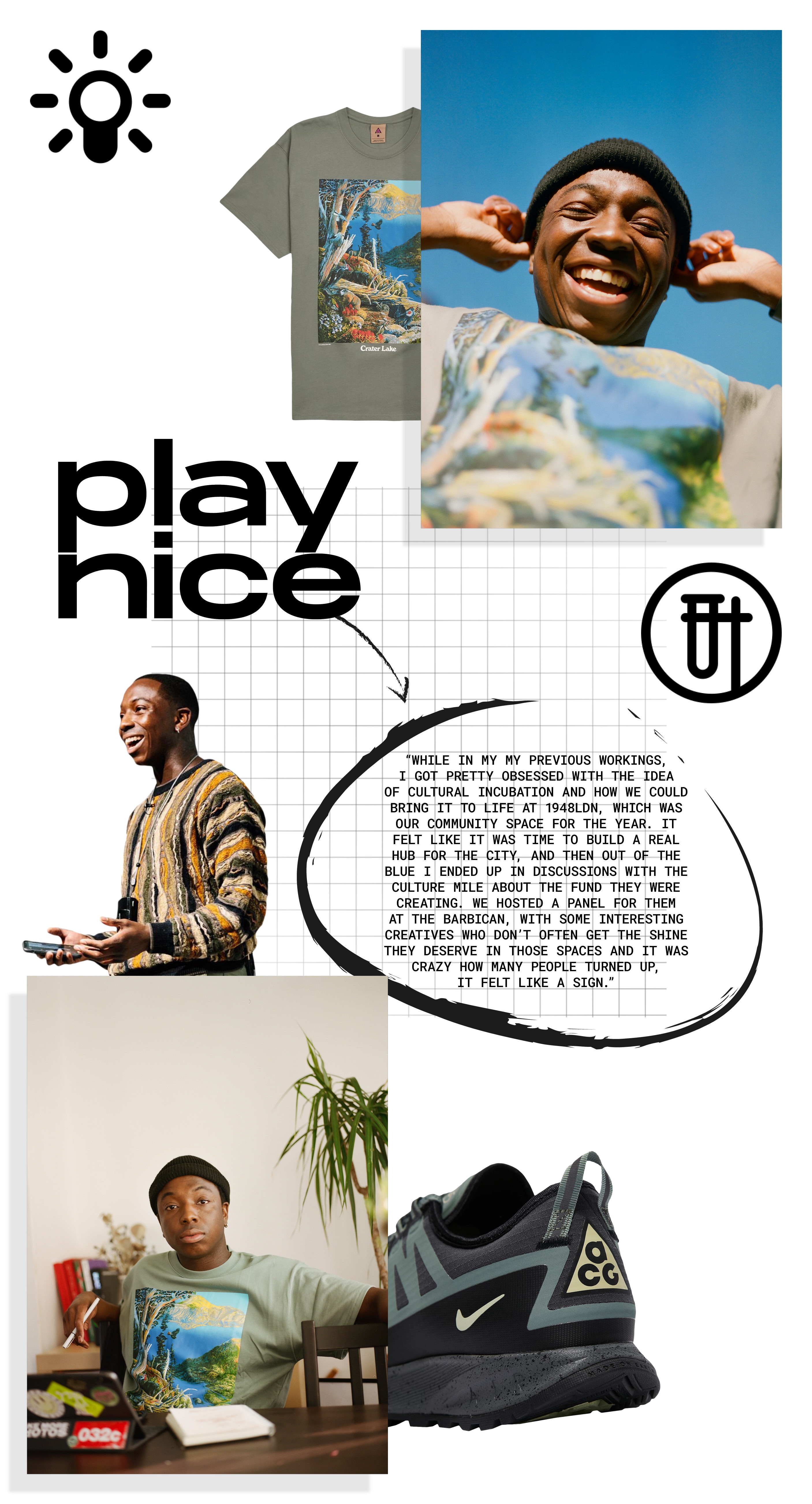
The Pattern is such an exciting project - can you tell me how it came about?
Nate Agbetu: While in my previous workings, I got pretty obsessed with the idea of cultural incubation and how we could bring it to life at 1948Ldn, a Nike-owned community space that I worked on over the course of a year. It felt like it was time to build a real hub for the city, and then out of the blue I ended up in discussions with the Culture Mile about the fund they were creating. We hosted a panel for them at the Barbican, with some interesting creatives who don’t often get the shine they deserve in those spaces and it was crazy how many people turned up, it felt like a sign. So we decided to apply for the fund ourselves, spent about a year pitching against other teams and here we are!
How has your perspective on the world shifted over the past year?
Nate Agbetu: I’d say I’ve definitely become more meditative and found my introverted side. I’m more interested in being present in the moment than creating spectacular moments these days, gratitude is an important part of staying sane in a wild world.
Has the pandemic changed the way you're working at Play Nice, or given you an extra sense of purpose?
Nate Agbetu: I think it’s helped others to see the reason why we do what we do, which has been interesting. The pandemic has definitely opened doors and helped us to create some of the work we could’ve only dreamed of two years ago when we started. So now we’re trying to take it steady and build solid foundations, but remaining fluid in our approach to things. I think your purpose in life is never clear and always changing as you grow, so we’re trying to embrace that and build ways for people to engage and benefit from being on the journey with us.
Have you reconnected with nature at all during the pandemic? Did you get out into the countryside at all?
Nate Agbetu: Nature’s been my best friend over the past year you know, it’s really helped me see beyond zone two of my city. I was so used to the rat race of London, looking for the next big thing and trying to keep it moving. But in nature you learn to appreciate stillness, the environment, and how small you can be in the grand scheme of things. I’ve cycled out to Kent, hiked up to Thor’s Cave in the Peak District and spent loads of time in my local wetlands. Every time there’s this moment of awareness that’s just priceless, I don’t think the concrete jungle quite matches it.
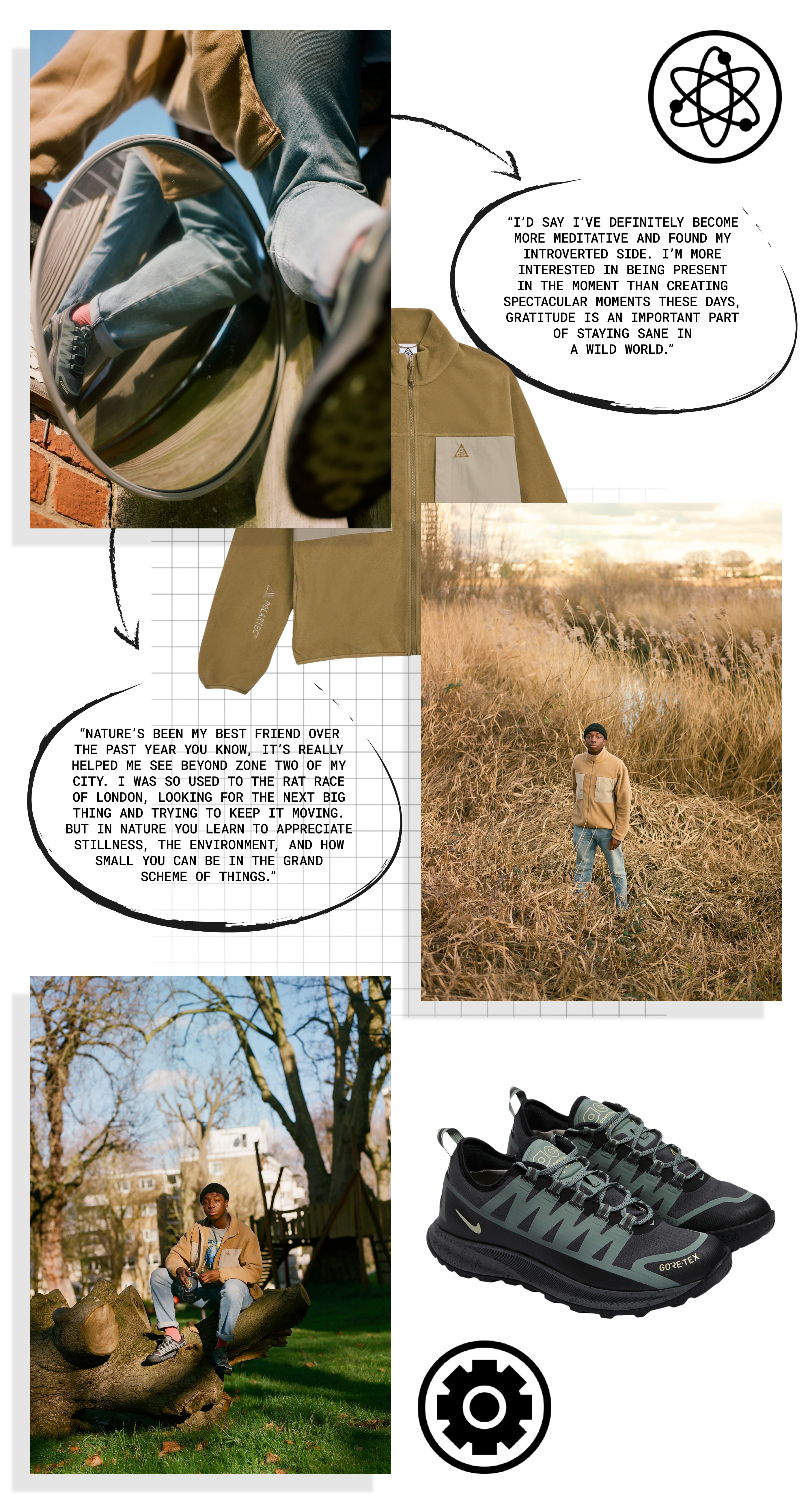
You were born and raised in London. Are there places outdoors you've regularly gone to keep your sanity? Some hidden spots?
Nate Agbetu: Yeah, Stokey’s been home my entire life. I’m lucky to have Clissold Park, the West Reservoir and Woodberry Wetlands on my doorstep. There’s a little community garden on my estate that we’re looking to develop in the spring, that last one is the only hidden spot I’m ready to share!
Your work is so community focussed - How have you seen your community come together during the pandemic?
Nate Agbetu: Sadly, loss has been the biggest thing that I felt bring us together, both in the black community and the queer community - there’s been so many fallen angels and broken systems that have sent us all in spirals. I’ve had to step back and really process those things in ways I’ve never had to before. But it’s making me more aware of my responsibility as a part of the spaces that I occupy, and hopefully setting the stage for real change.
What are you most looking forward to when Covid is over?
Nate Agbetu: Sharing space, I miss being in groups of beautiful people and diving into amazing experiences with them. I’m constantly thinking back to spending Carnival with Tropical Isles and everything that comes with those moments, the history, the whines, the food. Zoom could never.
You've set up Play Nice - what advice would you give to someone who is looking to set up their own thing. What does it take?
Nate Agbetu: I’d say to make something organic and just play around with it. Work with your friends, work on what inspires you, push yourself not your output. I think that when you’re critical about your reason for existing rather than what you make, people can feel it and there’s nothing like it.
LOIS SAUNDERS
Goalkeeper gloves aren’t necessarily classic sexy items, but Lois Saunders’ relentless reinvention and reimagining of thrift store items puts the protective equipment in a whole new context. You may have seen Saunders’ work over the past twelve months – her brand 1xblue appeared all over Instagram, and she admits even during the pandemic she’s had a really positive year, with sales increasing all the time.
Her DIY style is playful and true to her vision of fashion – when we talk she’s fully decked out in 1xblue. Her dresses made from football scarves aren’t because she’s a huge fan of the sport, but fascinated with graphics on knit. We spoke to Canterbury-born Saunders about why sustainability is so important to her as a designer and how she’s coped with the restrictions of coronavirus.
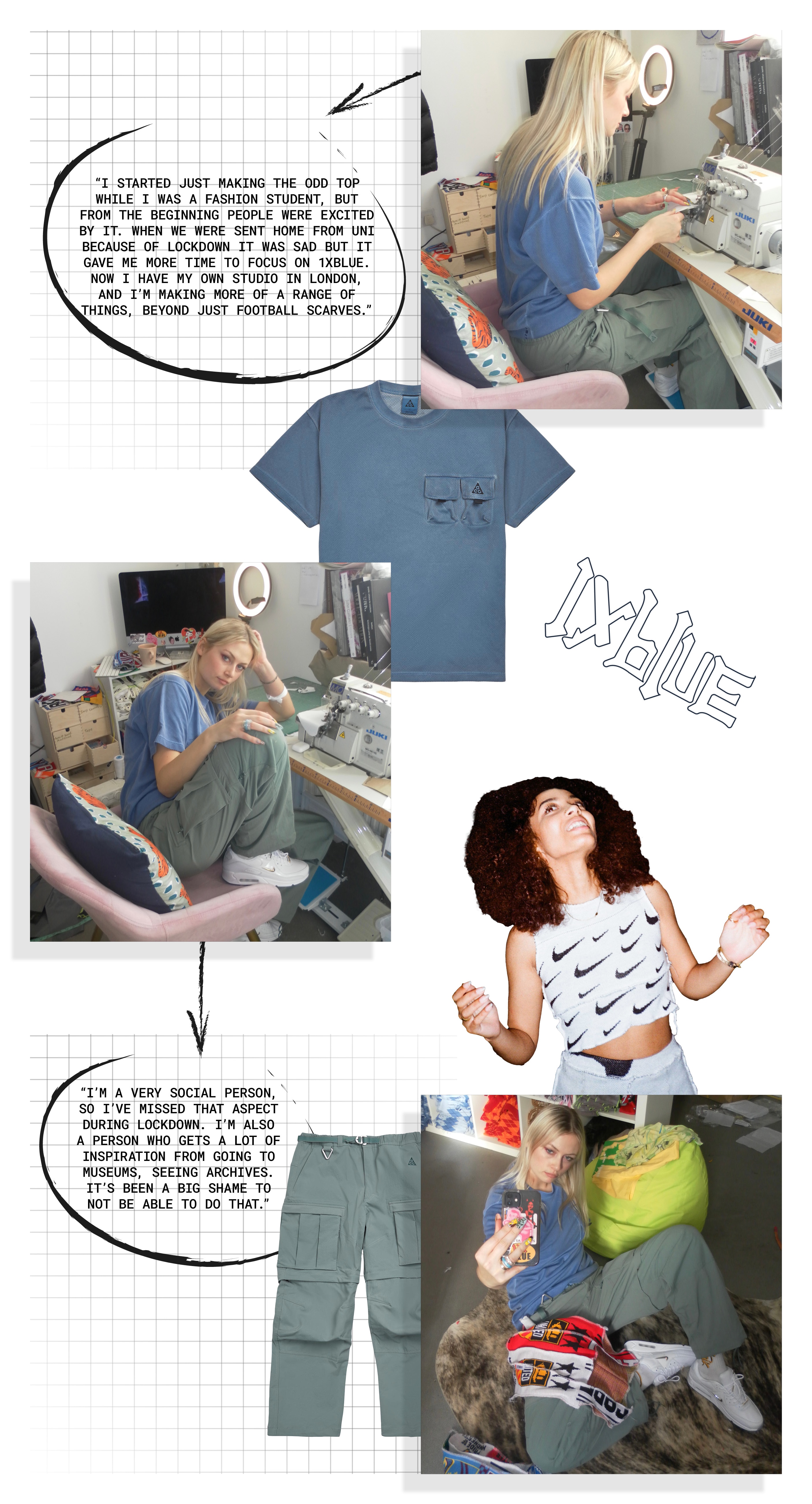
It’s been a year of your brand - tell us about your journey. Where did you start and where do you see it going?
Lois Saunders: I started just making the odd top while I was a fashion student, but from the beginning people were excited by it. When we were sent home from uni because of lockdown it was sad but it gave me more time to focus on 1xblue. Now I have my own studio in London, and I’m making more of a range of things, beyond just football scarves, and I’d love to work on a collection with fashion shows.
How has Covid affected your creativity?
Lois Saunders: I’m a very social person, so I’ve missed that aspect during lockdown. I’m also a person who gets a lot of inspiration from going to museums, seeing archives. It’s been a big shame to not be able to do that. I also take a lot of inspiration from books - I just got a John Galliano book that has some amazing imagery in it that gave me loads of ideas. However, I am so excited for art galleries and museums to return as that’s my main point of reference.
You live in London and grew up in Canterbury, have you found yourself craving the outdoors at all? Have you found a desire to reconnect with nature, or the countryside?
Lois Saunders: In the first lockdown I was going out cycling every single day. It’s so important for my mental health to get into the outdoors every day. Especially with the work that I do, it’s quite easy just to find yourself at the sewing machine all day, but it’s so important for me to see the sun and the sky.
Do you take inspiration from the outdoors, and being out in nature? Do you find it benefits your creativity?
Lois Saunders: Yes for sure! I find that being out amongst nature can really help with colour inspiration! I think it’s interesting to see weeds and flowers grow in odd places like out of a wall or something. I see a lot of these on my route to the studio and the tiny pops of colour can make me want to introduce it into a new design. Being outside definitely refreshes my mind, it can sometimes be difficult to think of new ideas when there’s no change of scenery.
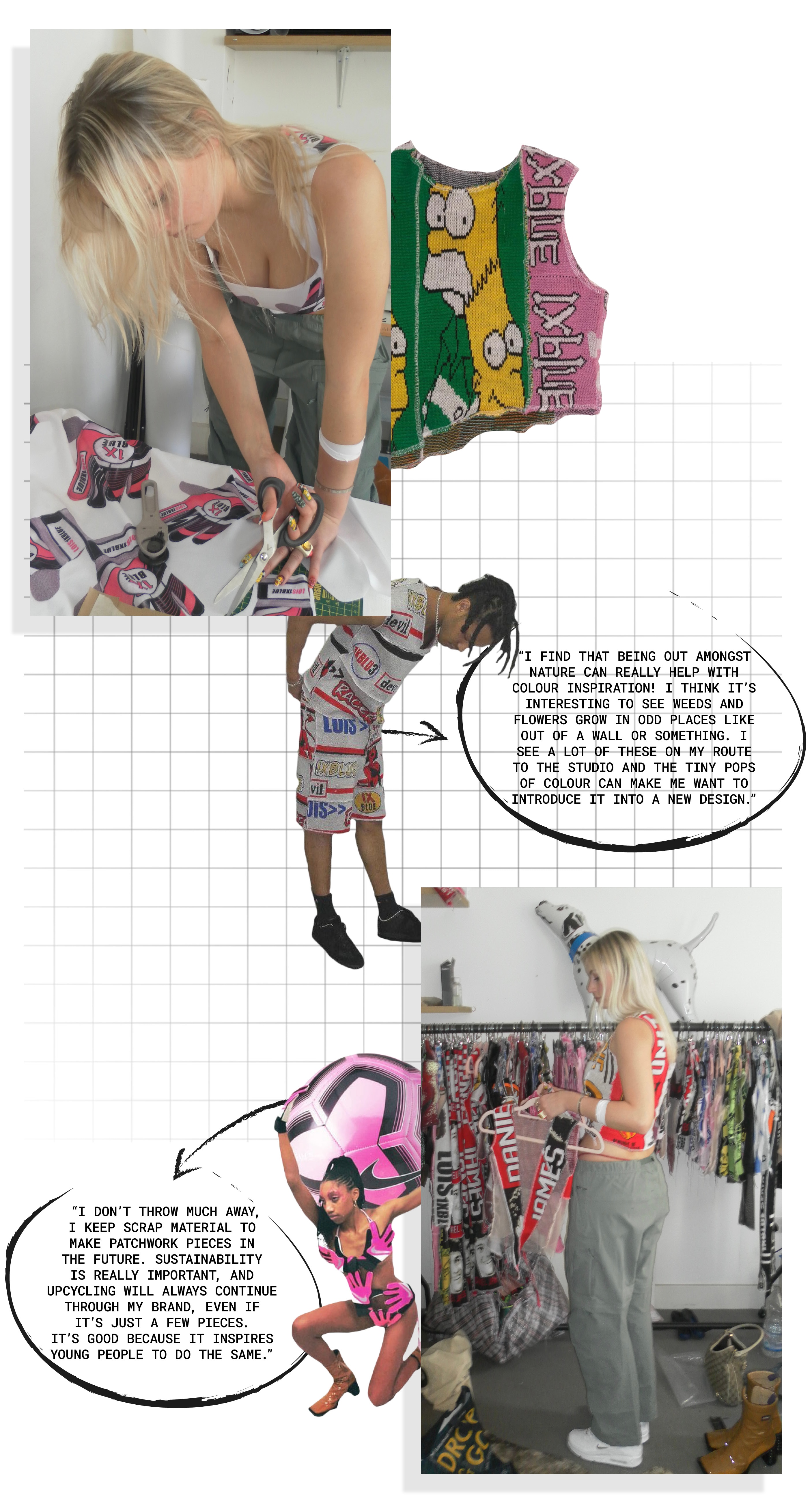
If you could live somewhere remote, at one with nature, where would it be?
Lois Saunders: Madagascar! I love nature. I’d love to say somewhere like the Arctic, which is beautiful and scenic, but I’m a hot weather person.
By nature, your work has a sustainability slant through reusing old product. Is this something that’s really important to you as a designer?
Lois Saunders: It’s massively important to me. Business-wise, it’s always challenging to be as sustainable as possible. I don’t throw much away, I keep scrap material to make patchwork pieces in the future. Sustainability is really important, and upcycling will always continue through my brand, even if it’s just a few pieces. It’s good because it inspires young people to do the same.
What are the things that you hope really change in fashion post-Covid?
Lois Saunders: I hope that fast fashion slows down. It’s quite scary how quick everything is done. It’s important for people to know more about what they’re buying and where it’s come from. Maybe with fast fashion I think if people knew all the details about how it’s made they might be put off. Also I hope people support small businesses. My brand has done well this year because I think people want to support a small business
Who are your biggest inspirations?
Lois Saunders: Isabella Blow. McQueen is also one of my biggest inspirations. I know it feels cliche to say these people but I’m just being honest! I love Mowalola, her use of colour, knits and graphics - definitely my thing, I get lots of inspiration from her. I love Paolina Russo too.
If you could give advice to someone young starting their own brand, what would it be?
Lois Saunders: If you find an idea, and think it works, just really believe in yourself and hopefully one day it’ll pick up. Find something that defines you and your creativity and just keep going with it, don’t lose faith.
ROBBIE GRIFFITH
While the average person on the street may not know what parkour is if you stopped them and asked them, there are an estimated 100,000 people doing parkour in Britain - that’s twice as many as there are skaters.
Parkour is a sport that evolved from military obstacle courses, and involves moving as quickly as possible through challenging terrains – both urban and rural – without the help of equipment. One of Britain’s most celebrated parkour practitioners is 20-year-old Glaswegian Robbie Griffith, an athlete who’s been training since he was 10. Here, he discusses the challenges of doing his sport during a pandemic, why we need to respect our countryside and the freedom that parkour makes you feel.
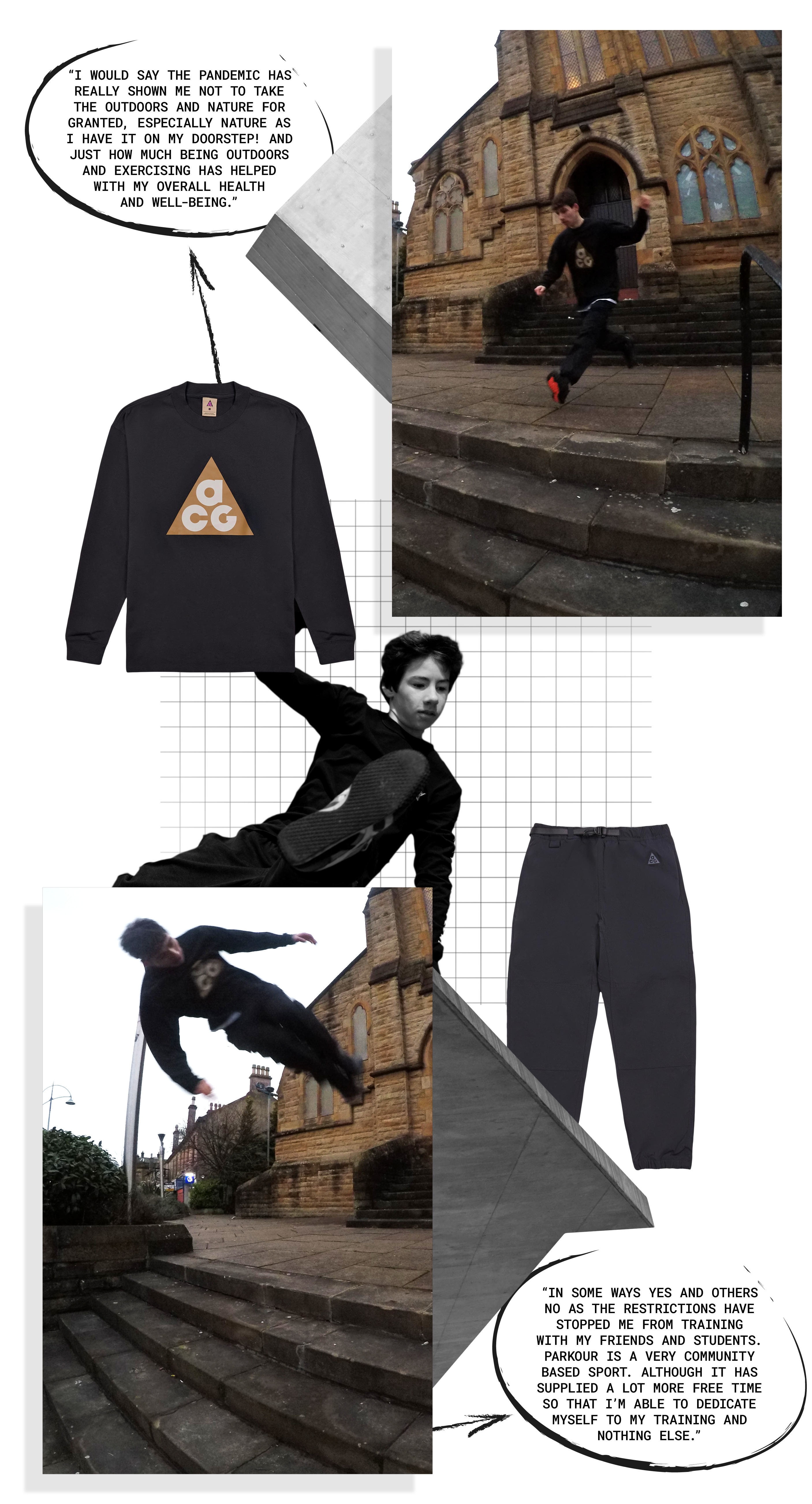
How has your view of nature and the outdoors changed during the pandemic?
Robbie Griffith: I would say the pandemic has really shown me not to take the outdoors and nature for granted, especially nature as I have it on my doorstep! And just how much being outdoors and exercising has helped with my overall health and wellbeing.
Has Covid given you more freedom to do parkour?
Robbie Griffith: In some ways yes and others no as the restrictions have stopped me from training with my friends and students. Parkour is a very community based sport. Although it has supplied a lot more free time so that I’m able to dedicate myself to my training and nothing else.
How do you hope the world changes post-Covid?
Robbie Griffith: I feel like the pandemic has urged a lot more people to exercise more and focus on their health as they have had so much free time and I just hope that they keep prioritising this when their busy work schedules return.
You are somebody who has dedicated their life to the outdoors - do you think people appreciate nature enough?
Robbie Griffith: I definitely don’t and feel like the pandemic has forced people to open their eyes as to just how beautiful our countryside, parks and cites really are!
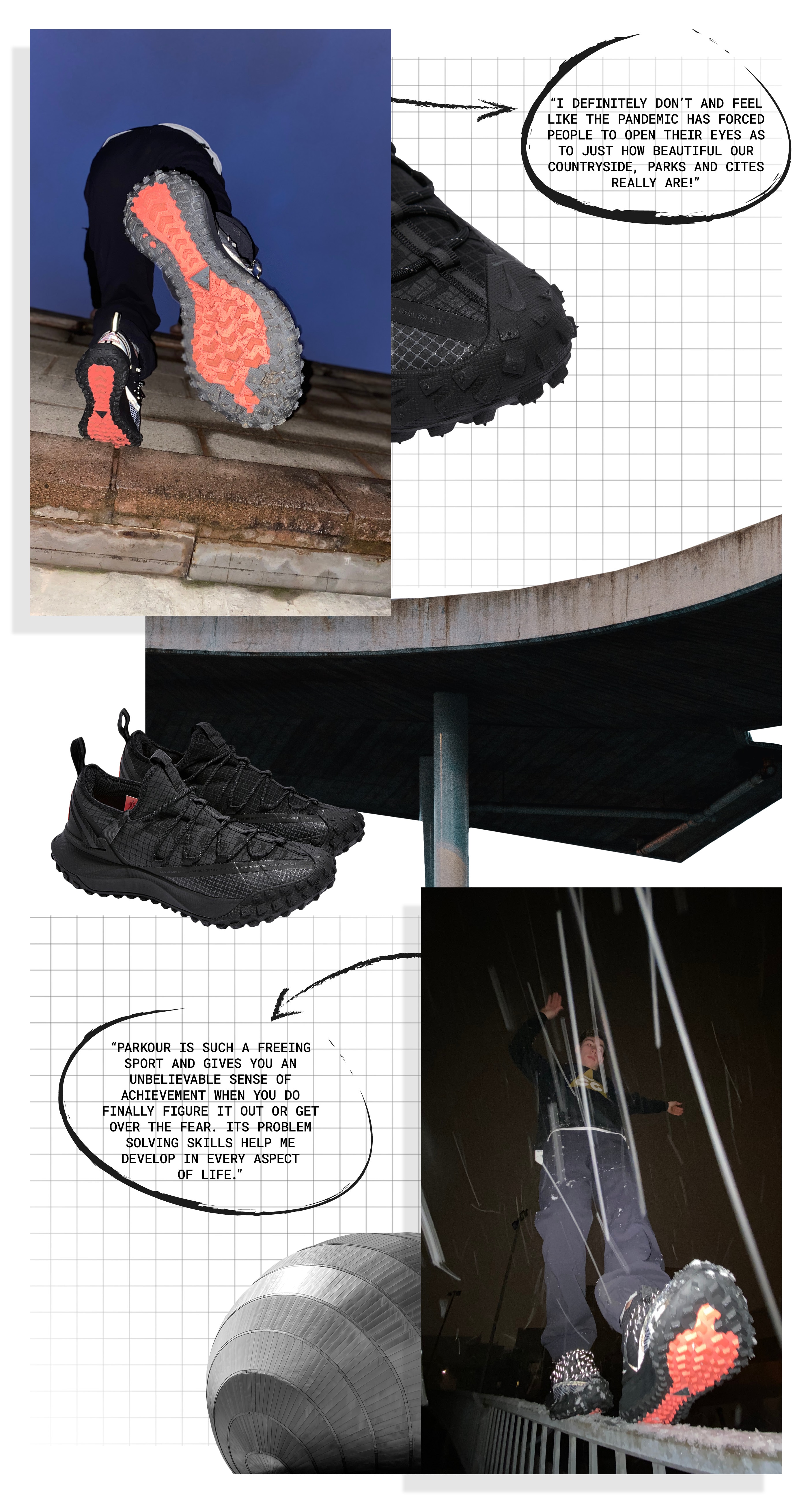
How did you get into parkour? How do you feel when you do it?
Robbie Griffith: I was handed a flyer for local parkour classes at school at the age of 10 and haven’t stopped training since! Parkour is such a freeing sport and gives you an unbelievable sense of achievement when you do finally figure it out or get over the fear. Its problem solving skills help me develop in every aspect of life.
What advice would you give to somebody who wanted to start?
Robbie Griffith: I’d say to try get yourself along to some structured classes and reach out to your local parkour community. Take everything in baby steps and stay safe!
Which city in the world would you like to do parkour in, but haven't been able to reach yet?
Robbie Griffith: Sydney is top of my bucket list for sure! For both the architecture and the community.
Where's the most beautiful place in the world to do parkour?
Robbie Griffith: Santorini, Greece.
Written by @thomasgorton
Special thanks to @birdgirluk, @lois1xblue, @nateagbetu, @robbirgriffith
Explore more:












